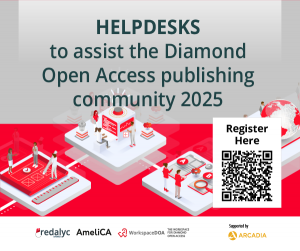Helpdesks to assist the Diamond Open Access publishing community 2025

As part of Redalyc and AmeliCA’s commitment to the Diamond Open Access publishing community, in April 2025 we established specialized helpdesks for scientific journal editors. These personalized sessions are designed to save you time and streamline your workflows by providing:
- Direct answers to your specific questions about editorial processes.
- Expert guidance on utilizing our tools and managing your publications effectively.
- Personalized support for navigating unique challenges and cases.
- An opportunity to connect with Redalyc and AmeliCA members.
If you are an editor or represent an institution from a journal indexed in Redalyc and AmeliCA and need to discuss a particular case we invite you to sign up individually to participate in a helpdesk session. A session will be scheduled once a minimum of 5 and a maximum of 10 editors or participants have registered. This ensures a productive and focused discussion, lasting no more than one hour.

Our helpdesks foster direct interaction between Redalyc and AmeliCA members and journal editors, creating a valuable space for experience-sharing and the strengthening of editorial management practices.
During the registration process, editors will be able to see the specific dates and times when the sessions are available (Wednesdays at 10:00 a.m. GMT-6). After registering for a specific date, editors will receive a confirmation email with a unique link to join the session they selected. Interested editors will register directly through this link.
Don’t miss this opportunity for personalized support!
The establishment of dedicated help desks for journals within the infrastructure of Redalyc and AmeliCA represents a significant advancement for the global Diamond Open Access ecosystem, strengthening the conception of science as a global public good. This collaborative effort will consolidate a more robust and sustainable scientific communication infrastructure, expanding access to knowledge for the benefit of the international scientific community..
We reiterate our firm commitment and dedication to the ongoing benefit of Diamond Open Access journals.